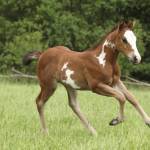Ascarids: Parasites in Young Horses and Treatment Plans

The damaging effects of ascarids (Parascaris spp.) hit young horses hardest. Foals, weanlings, and yearlings are much more susceptible to this parasite than mature horses. As expected, horses on poor deworming programs are at the greatest risk. Use of deworming products on horses with a substantial parasite burden sometimes causes a spontaneous and substantial die-off of adult parasites, causing intestinal obstruction and colic symptoms.
Like other parasites, ascarids are detectable on routine fecal egg count, though variability in egg count results in inconsistency of treatment plans.
Researchers from Charles Sturt University in New South Wales, Australia, investigated the impact of variability in fecal egg counts of ascarids in clinical decision-making*. Fecal samples from 53 foals were collected on three separate days, and an egg count was performed on three portions from each sample. A single fecal egg count was compared with multiple samplings. Researchers set out to determine how accurately they could estimate the egg distribution mean (EDM) for the entire digestive tract from different numbers of samplings, as eggs in the digestive tract are known to be spread unevenly.
The researchers concluded “that a single fecal egg count is of little value for estimating EDM in feces, and more than one fecal egg count should be performed to determine if a foal has a patent infection and/or the requirement for anthelmintic treatment.” They also noted the implications for false negative counts, primary of which is the growing concern regarding resistance of ascarids and other parasites to certain classes of dewormers.
“Developing an appropriate deworming protocol based on fecal egg counts still remains the best way to avoid damaging infestation in susceptible horses. A veterinarian is the best resource for all parasite-prevention programs,” said Kathleen Crandell, Ph.D., a nutritionist with Kentucky Equine Research (KER).
Despite adequate nutrition, young horses with significant parasite loads can look poor, often ribby and pot-bellied. While suppression of parasite load through a gradual deworming protocol overseen by a veterinarian is the first step to regaining health, supplementation with an omega-3 product such as EO-3 may help with body-wide inflammation associated with the insult caused by parasites.
“The long-chain fatty acids in marine-derived supplements have numerous anti-inflammatory benefits that weave through multiple body systems, so supplementation with EO•3 could help in the recovery process,” Crandell continued.
*Wilkes, E.J.A., R.G. Woodgate, S.L. Raidal, and K.J. Hughes. 2016. The application of Parascaris faecal egg count results for clinical decision making in foals. In: Proc. 38th Bain Fallon Lectures. Equine Veterinarians Australia, p. 8.








